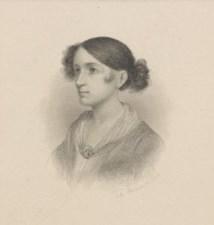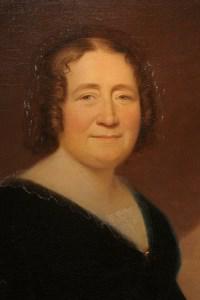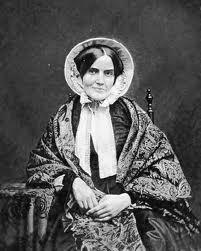Witness to the Assassination of Abraham Lincoln Clara Harris was an American socialite. Harris and her then fiance Henry Rathbone were the guests of President Lincoln and First Lady Mary Todd Lincoln at Ford’s Theatre on April 14, 1865, when John Wilkes Booth fatally shot the President. Early Years Clara Harris was born on September 9, 1834 in Albany, New York, one of four children of Senator Ira Harris and his first wife Louisa Tubbs Harris. Clara’s mother died 1845. On August 1, 1848, Ira Harris married widow Pauline Rathbone, who had two sons, Jared and Henry. From the ages of 13 and 11 respectively, Clara and Henry were raised in the same household. To their parents’ dismay, the two…

Matilda Hoffman
Washington Irving’s One and Only Love Though she died very young, Matilda Hoffman made such a deep impression on the young American author Washington Irving (The Legend of Sleepy Hollow) that he mourned her passing for the rest of his life. Decades later, the mere mention of her name left him speechless. Sarah Matilda Hoffman was born in 1791, daughter of Josiah Ogden and Mary Colden Hoffman. Matilda, as she was known, grew up in Manhattan and Albany, New York. Her mother died when she was six years old and her father married Maria Fenno five years later and began a second family. Maria was only ten years older than Matilda.
Jane Currie Blaikie Hoge
Civil War Nurse and Relief Worker Jane Currie Blaikie Hoge was a Civil War nurse, sanitary reformer and relief worker who is best remembered for her impressive organizational skills in providing medical supplies and other items to Union soldiers during the Civil War. After seeing some of the deplorable conditions suffered by the troops, Hoge became a leader in sanitary reform, which included activities such as collecting and distributing food, clothing, and medical and hospital supplies. She was also active in recruiting nurses for the army. Early Years Jane Currie Blaikie was born on July 31, 1811 in Philadelphia, Pennsylvania, the daughter of George Blaikie, a wealthy merchant, and Mary Monroe Blaikie. Jane was educated at the Young Ladies’ College,…
Emma LeConte
Witness to the Burning of Columbia, South Carolina Emma Leconte was only seventeen years old when she recorded in her diary the systematic burning of Columbia, SC during General Sherman’s Carolinas Campaign. During the war Emma remained in the city with her mother, while her father Joseph LeConte, a former professor at South Carolina College, worked as a chemist in the Confederate States Nitre and Mining Bureau attempting to make gunpowder for the Confederate army. After completing his famous March to the Sea by capturing Savannah, Georgia in December 1864, Union General William Tecumseh Sherman began planning his invasion of South Carolina. Emma LeConte began writing a diary on December 31, and her first entry leaves no doubt about her…

Almira Phelps
Educator and Author of Science Textbooks Almira Phelps was a 19th century educator and author who published several popular science textbooks, the most famous of which was Familiar Lectures on Botany (1829). Although it was received with condescension by male scientists, this book introduced a new style of science book for young students and influenced women to study the natural sciences. She wrote textbooks in all major fields of science except astronomy. Almira Hart was born on July 15, 1793, in Berlin, Connecticut, the youngest of seventeen children. She grew up in a family of intellectuals who prized independent thinking, and received much of her education at home, where her siblings debated literature and politics. She was also an avid…
Maryland Women in the Civil War
Women in the Border State of Maryland Many Maryland women made significant contributions to the Union war effort. As a border state having both slaves and free African American women, Maryland was divided in sentiment between the Union and the Confederacy. The most famous conductor on the Underground Railroad, Harriet Tubman was also an escaped slave from Maryland’s Eastern Shore. Harriet Tubman also served as a Union nurse and spy, and she was the first woman to lead an armed expedition. In June 1863, she guided three steamboats around Confederate mines in the waters surrounding Port Royal, South Carolina in the Combahee River Raid, which liberated more than 700 slaves. Anna Ella Carroll played a significant role as advisor to…

Delia Bacon
Woman Who Thought Shakespeare Was a Fraud Delia Bacon was an American author and playwright who is best know today for her theory that William Shakespeare’s plays were actually written by a group of British men, including Francis Bacon (no relation), Sir Walter Raleigh and others. Early Years Delia Salter Bacon was born on February 2, 1811 on what was then the frontier in Tallmadge, Ohio, the daughter of a minister, who left New Haven for the wilds of Ohio in pursuit of a vision. In 1817 her father went bankrupt and the family moved to Hartford, Connecticut, and her father died soon after. All six children were promptly farmed out to friends of the family. Delia was lucky enough…
African American Women Spies
Black Women Intelligence Agents in the Civil War Other than a very few famous African American women spies, little is known about the black women who gathered intelligence for the Union during the Civil War. We do know that some were former slaves and others were free women who volunteered to spy on the Confederacy, often at great risk to their own personal safety. Image: Unidentified African American Woman Escaped slaves served as a primary source of intelligence for the Union Army. Throughout the official records of the war, however, there are frequent references to bits of intelligence coming from contrabands, a term that dates back to early 1861 at Fort Monroe, Virginia. General Benjamin Butler refused to return three…

Jane Colden
Colonial America’s Woman Botanist In the early eighteenth century only a few women in England and the American colonies were involved in any field of science. Those few were usually related to a man who worked in the field. Jane Colden (1724-1766) was introduced to botany by her father, and became the first woman botanist in America. Jane Colden was born in New York City on March 27, 1724, the daughter of New York physician, governor and botanist, Cadwallader Colden, who learned about the use of plants for medicinal purposes as part of his education in Scotland.
Elizabeth Todd Edwards
Sister of Mary Todd Lincoln In October 1839, twenty-year-old Mary Todd moved to Springfield, Illinois to live with her older married sister Elizabeth Todd Edwards. As was the custom, Elizabeth served as Mary’s guardian. Despite their sometimes rocky relationship, Elizabeth rescued Mary Todd Lincoln from an insane asylum in 1875, and gave her a home. Image: Elizabeth Todd Edwards and Mary Todd Lincoln Elizabeth Todd was born in 1816 in Lexington, Kentucky. Her sister Mary was born on December 13, 1818. Their mother Eliza Parker Todd died of a post-birth bacterial infection in 1824. Fourteen months later, their father Robert Todd married Elizabeth Humphreys. Over the next 15 years, nine half-siblings joined the family. Mary did not get along with…